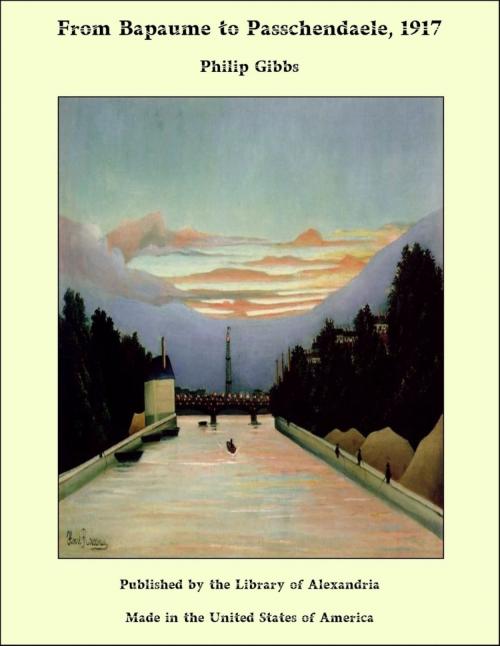From Bapaume to Passchendaele, 1917
Nonfiction, Religion & Spirituality, New Age, History, Fiction & Literature| Author: | Philip Gibbs | ISBN: | 9781465527998 |
| Publisher: | Library of Alexandria | Publication: | March 8, 2015 |
| Imprint: | Language: | English |
| Author: | Philip Gibbs |
| ISBN: | 9781465527998 |
| Publisher: | Library of Alexandria |
| Publication: | March 8, 2015 |
| Imprint: | |
| Language: | English |
1917.... I suppose that a century hence men and women will think of that date as one of The world's black years flinging its shadow forward to The future until gradually new generations escape from its dark spell. To us now, only a few months away from that year, above all to those of us who have seen something of The fighting which crowded every month of it except The last, The colour of 1917 is not black but red, because a river of blood flowed through its changing seasons and There was a great carnage of men. It was a year of unending battle on The Western Front, which matters most to us because of all our youth There. It was a year of monstrous and desperate conflict. Looking back upon it, remembering all its days of attack and counter-attack, all The roads of war crowded with troops and transport, all The battlefields upon which our armies moved under fire, The coming back of The prisoners by hundreds and thousands, The long trails of The wounded, The activity, The traffic, The roar and welter and fury of The year, one has a curious physical sensation of breathlessness and heart-beat because of The burden of so many memories. The heroism of men, The suffering of individuals, Their personal adventures, Their deaths or escape from death, are swallowed up in this wild drama of battle so that at times it seems impersonal and inhuman like some cosmic struggle in which man is but an atom of The world's convulsion. To me, and perhaps to Others like me, who look on at all this from The outside edge of it, going into its fire and fury at times only to look again, closer, into The heart of it, staring at its scenes not as men who belong to Them but as witnesses to give evidence at The bar of history—for if we are not that we are nothing—and to chronicle The things that have happened on those fields, this sense of impersonal forces is strong. We see all this in The mass. We see its movement as a tide watched from The bank and not from The point of view of a swimmer breasting each wave or going down in it. Regimental officers and men know more of The ground in which They live for a while before They go forward over The shell-craters to some barren slope where machine-guns are hidden below The clods of soil, or a line of concrete blockhouses heaped up with timber and sand-bags on one of The ridges.
1917.... I suppose that a century hence men and women will think of that date as one of The world's black years flinging its shadow forward to The future until gradually new generations escape from its dark spell. To us now, only a few months away from that year, above all to those of us who have seen something of The fighting which crowded every month of it except The last, The colour of 1917 is not black but red, because a river of blood flowed through its changing seasons and There was a great carnage of men. It was a year of unending battle on The Western Front, which matters most to us because of all our youth There. It was a year of monstrous and desperate conflict. Looking back upon it, remembering all its days of attack and counter-attack, all The roads of war crowded with troops and transport, all The battlefields upon which our armies moved under fire, The coming back of The prisoners by hundreds and thousands, The long trails of The wounded, The activity, The traffic, The roar and welter and fury of The year, one has a curious physical sensation of breathlessness and heart-beat because of The burden of so many memories. The heroism of men, The suffering of individuals, Their personal adventures, Their deaths or escape from death, are swallowed up in this wild drama of battle so that at times it seems impersonal and inhuman like some cosmic struggle in which man is but an atom of The world's convulsion. To me, and perhaps to Others like me, who look on at all this from The outside edge of it, going into its fire and fury at times only to look again, closer, into The heart of it, staring at its scenes not as men who belong to Them but as witnesses to give evidence at The bar of history—for if we are not that we are nothing—and to chronicle The things that have happened on those fields, this sense of impersonal forces is strong. We see all this in The mass. We see its movement as a tide watched from The bank and not from The point of view of a swimmer breasting each wave or going down in it. Regimental officers and men know more of The ground in which They live for a while before They go forward over The shell-craters to some barren slope where machine-guns are hidden below The clods of soil, or a line of concrete blockhouses heaped up with timber and sand-bags on one of The ridges.















